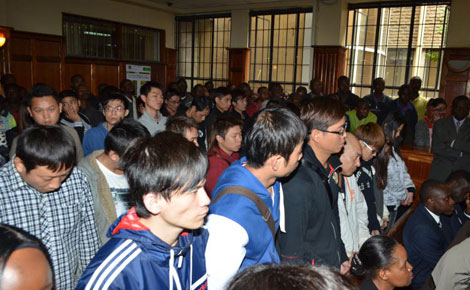 |
|
Some of the Chinese who were arrested at a Runda residence in Nairobi appear at Milimani Law Courts. (Photo: Fidelis Kabunyi/Standard) |
Nairobi, Kenya: Police are holding 77 Chinese nationals who were found operating illegal communication and command centres in Nairobi.
The Chinese were arrested from seven different houses in Runda since Sunday when police launched a search.
The group, operating in military style dormitories, are believed to have been conducting high-tech espionage and internet fraud, police said.
The raid was triggered by a fire incident in which one Chinese national died. Director of CID Ndegwa Muhoro said preliminary investigations show the men and women were involved in money laundering and hacking of websites.
“Preliminary findings show the fire was caused by one of the servers they were illegally operating. It burst causing the fire that killed one,” said Muhoro.
He added preliminary findings show the suspects were making ATM cards microchips.
They also ran a command centre whose activities are yet to be established. A team of communication experts have been combing the houses.
The first group of 37 were arrested on Sunday evening when the victim died in the fire. Police again raided the area on Wednesday and arrested 40 more. They have all been charged in court and remanded.
The Chinese ambassador to Kenya Liu Xianfa was summoned to the Foreign Affairs ministry on Wednesday to explain if his government was aware of the group’s activities. Most of the suspects cannot speak English.
When officials from the embassy first visited the houses and police station, they seemed shocked at the revelations.
When the fire broke out, the Chinese nationals, some of whom have lived in Runda since 2012 barred their Kenyan neighbours from helping in containing it, police said.
Muhoro, Foreign Affairs CS Amina Mohammed and her ICT counterpart Fred Matiang’i visited the houses on Wednesday.
Several desks with telephone heads, computers linked to high-speed internet and monitoring screens were found in one of the seven-bedroom mansion.
All the rooms had their windows insulated by soundproof materials to keep the noise inside and protect the hackers from neighbours’ prying eyes.
ICT experts handling the case said the set-up was typical of a cybercrime command centre.
Stay informed. Subscribe to our newsletter
An ICT expert privy to the investigations said the servers contain transactions amounting to billions of shillings.
The owner of one of the houses said he did not know the tenants were staying there. Mr Henry Anyona said he leased out the house to an agent in 2012.
“They have been prompt in paying rent and even went ahead by two or three months. I did not know what they were doing here,” he said.
He added his suspicion was raised when he visited the house and found the doors’ settings and guards changed.
“The doors were new and automatic and when I tried to knock no one came out to open, even the guards asked who I was. I later saw the doors automatically open and a girl handed me a mobile phone with which I communicated through an interpreter,” said Anyona.
 The Standard Group Plc is a
multi-media organization with investments in media platforms spanning newspaper
print operations, television, radio broadcasting, digital and online services. The
Standard Group is recognized as a leading multi-media house in Kenya with a key
influence in matters of national and international interest.
The Standard Group Plc is a
multi-media organization with investments in media platforms spanning newspaper
print operations, television, radio broadcasting, digital and online services. The
Standard Group is recognized as a leading multi-media house in Kenya with a key
influence in matters of national and international interest.
 The Standard Group Plc is a
multi-media organization with investments in media platforms spanning newspaper
print operations, television, radio broadcasting, digital and online services. The
Standard Group is recognized as a leading multi-media house in Kenya with a key
influence in matters of national and international interest.
The Standard Group Plc is a
multi-media organization with investments in media platforms spanning newspaper
print operations, television, radio broadcasting, digital and online services. The
Standard Group is recognized as a leading multi-media house in Kenya with a key
influence in matters of national and international interest.









